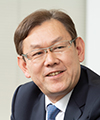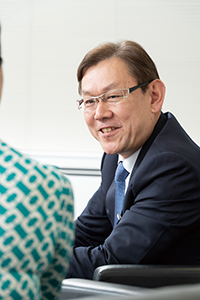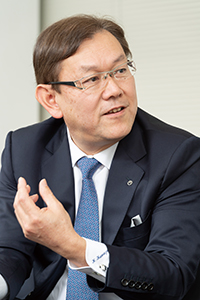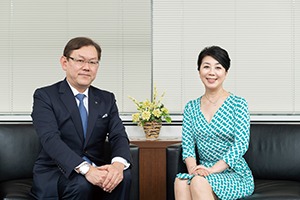 |
|
|
|
|
|
View from the Top Vol. 17, No. 5, pp. 1–4, May 2019. https://doi.org/10.53829/ntr201905tp1
Creating Happiness with ICT by Making the World Smart and Technology NaturalOverviewThe NTT laboratories heretofore have focused on research supporting NTT’s own services and systems. However, their strategy has been shifted to the promotion of the B2B2X (business-to-business-to-X) model and now emphasizes value creation with partner companies. What is the mindset at the NTT laboratories to advance research and development (R&D) with the aim of creating innovation for people to live their lives more affluently and in a more natural manner? Katsuhiko Kawazoe, Senior Vice President and the head of Research and Development Planning, NTT, was asked about his attitude toward R&D that will transform the world. Keywords: smart world, natural technology, happiness What kinds of research and development (R&D) and technology make people happy in the true sense?—It has been half a year since you took up your current position. What do you think so far? My prior position as the head of a laboratory group was somewhat an extension of my specialties. However, the current position as the head of Research and Development Planning involves managing all the NTT laboratories while also supervising R&D across the entire NTT Group. In other words, I now determine what kind of new world our R&D in different fields should create, and lead the labs to generate new value inside and outside the NTT Group and society through the daily accumulation of research in the labs. As you probably know, we are promoting the business-to-business-to-X (B2B2X) model and have expanded our business activities accordingly. Promoting the B2B2X model is one of the pillars of our medium-term management strategy “Your Value Partner 2025,” which encourages us to support the second B in creating new value and to conduct R&D that contributes to that value creation. Our lab members have already been pursuing various efforts in line with this strategy. Moreover, I believe it is vital to further accelerate our R&D by collaborating with more partners, and I’d like to promote this belief under the catchphrase “Making the world smart and technology natural.” As for the meaning of natural in that catchphrase, for example, a smartphone is really a convenient tool. However, when we contact someone via smartphone, we first consider what application the other party is using on their smartphone. Then, we consider whether the line is faster by using 4G (fourth-generation wireless) or Wi-Fi and how to send images according to the usage environment, and we change the phone settings accordingly. This procedure is no problem for smartphone users who do not think it is a burden, but some users do consider it a burden. For the latter users, although most of the current smartphones will automatically connect to a faster network, tasks such as selecting the application and pre-setting are still a considerable burden. We want to reach out to those users—that is, pause just for a while as various functions evolve and enable anyone to use services smoothly. The word natural has come up to describe that aspiration. Making technology natural may mean thinking about what function really makes people happy.
Show new possibilities and create the next developments while facing the times—The catchphrase “Making the world smart and technology natural” reflects your true feelings. What kind of research will make the world smart? Some studies are aimed at realizing a smart world, however, that is not what this is all about. I think that it is also necessary to bring smart into the process of advancing research itself. Currently, many departments are in charge of R&D, especially development, in various parts of the NTT Group. Under those circumstances, the NTT laboratories are very special. Here, special refers to a researcher’s way of thinking and the subject that the researcher is tackling—which is clearly different from development in general. Therefore, I think it is meaningful to go back to the starting point of the research and re-evaluate what role researchers should play and what research can only be done by NTT. We have created many technologies so far. A recent example is our successful demonstration of wavelength-division-multiplexed optical transmission at 1 Tbit/s per wavelength over a long distance—a world first—by using digital signal processing technology and ultra-broadband optical front-end integrated device technology. This optical transmission technology enables transmission rates that are ten times the capacity—namely, 100 Gbit/s per wavelength—of current practical systems. It is therefore expected to achieve the high-capacity communications networks that will help expand Internet of Things and 5G services. Simply put, it has tremendous potential in terms of achieving the ultimate low-latency transmission in an end-to-end manner, which would enable 4K/8K video to be transmitted in real time without having to compress it. I have the feeling that this will lead to paradigm shifts in various industries. The origin of such technology is basic research. That basic research leads to applied research, the fruits of which are further developed for practical use. That’s why I want to enhance our basic research. On the basis of that, I think it is important to create a flow from basic research to practical development and then to commercialization of services and the creation of new business. This flow will allow our research to flourish in the form of value creation for the world, and that is exactly what I mean by “making the world smart.” Incidentally, software has been highlighted in many ways such as software-defined networking and open source software in the past several years; however, I think it is necessary to reaffirm the importance of hardware. That’s because software runs and generates its value on innovative hardware. There are various limitations due to technical difficulties and costs, but there are some things only hardware can provide, such as ultra-wideband optical front-end integrated devices, and I believe that it is essential to produce such things and take up the challenge of improving them. I think that as part of the smart flow I mentioned before, it is necessary to view R&D in total, including not only software but also hardware. We have been talking from a viewpoint of problem solving in society. However, I think that we must consider another viewpoint of growing a sense of happiness, too. Matters that generate a sense of happiness are not universal. For example, Japanese people think that sushi is delicious; but, many people in countries that do not like cold meals generally do not think it is delicious. However, people from such countries are increasingly visiting Japan and enjoying sushi. That situation shows that people’s values can change through experience and be shared with others. I think there are many ways that people can share values, and sharing values has been my major research theme as a researcher, and it has also become a research policy. I’d be very happy if we could be involved in inspiring people and making them happy. And I think that hope will become one of the themes of our smart research. From a global perspective, our current medium-term management strategy lays out “strengthening competitiveness of global business” and “globalization of R&D.” We aim to enhance basic research as efforts to create innovative things and something entirely new, and accordingly, we have established a new research corporation, NTT Research, Inc., in Silicon Valley in the US. In addition to spreading the achievements of the NTT laboratories globally, we are also promoting the globalization of our R&D targets. The research themes originate not only in Japan but also all over the world. Taking a global view of ideas for creating new technologies, services, and business for solving various problems scattered around the world, we are grasping the research themes that are revealed from that viewpoint. I believe the globalization of R&D is not only about expanding seeds that have grown domestically but also actively incorporating seeds that have grown around the world and those that can be expected to grow in the future.
Believe in one’s identity while advancing diversity—How were these values created? I lived in New York, where people of many different cultures are gathered from around the world, until the second grade of elementary school. There were few Japanese there at that time, and it was difficult for children to develop their own identity in the community. In those environments, I had the experience of gradually opening my heart to others and being accepted by them. As for my research activities when I was in graduate school, I sometimes wondered what it is to be human and what research activities would be best to carry on with. At that time, I studied anthropology and learned that it was important to recognize that people have different values and senses of happiness. That recognition is at the root of my current stance. In regard to R&D, there are various types of research in a wide range of fields that cannot be described in one word. Moreover, there are researchers involved in such research around the world. Under those circumstances, researchers should aim to pursue research with the pride and conviction that new services and value will not be created if they do not research this theme or have the attitude “Who will do this research if I don’t do it myself?” At one time, there was an argument that we do not necessarily have to aim to be number one. That is still true and I think it is possible to create new value by thoroughly pursuing anything that anyone can think up. However, researchers tend to take pride in achieving things through difficult means. If the result is the same, it doesn’t matter if it was difficult or easy to create. I think whether the results of research really benefit the world is important. Many researchers don’t actually mind struggling to solve difficult problems and even find it stimulating to do so. There is no doubt that they are all very hard workers. However, it is sometimes unrealistic to doggedly stick to a pursuit because doing so doesn’t always lead to the happiness of society. I think that their efforts will be fruitful if researchers keep a broad view and do not lose sight of the goal of serving the world. That’s why I want to stick to playing the role of giving advice—in the phase from basic research to applied research—on whether or not research will lead to the happiness of people in society, which is another need we must consider. And I think it would be of great value to NTT to deeply explore that direction. On the contrary to what I said above, not all researchers take this viewpoint and I think it is impossible to force them to do so. Diversity is very important, and some people have exceptional talent. My duty is therefore to gather those people together and lead them to achieve the goals that are set.
—Since you have been a researcher yourself, you must have learnt many lessons. Would you like to say a word to your researchers? My research theme when I joined NTT was satellite communications. I was really happy to work on a fantastic theme associated with the space. However, NTT changed its business model from owning communications satellites to leasing them from other companies. I was really shocked because I thought that it was a theme I could tackle over a lifetime. When I was pondering what to do in the future, a colleague mentioned that the research related to content was pretty close to what I was doing with satellites. Although I didn’t really know how and where satellites and content could be connected, my colleague convinced me that it was better to research content from then on because the age of content was coming. With those words in mind, I was able to extend my research themes to IP (Internet protocol) television and our ultrahigh presence communications technology called “Kirari!”. As researchers, you may be forced to take an about-turn in the future. I must admit a research theme that lasts forever is great, very important, and worthwhile, but, one day, the theme may not be the target of research anymore. However, that does not mean that you are not needed anymore because there is no longer work to do. I believe that research is in the mindset, and themes will follow accordingly. The mindset in that sense means the intention of researchers, for example, the intention to invent and propose new principles, the intention to understand a certain phenomenon and clarify its mechanism, and the intention to create as a form what has never been created before, and these intentions do not depend on the research theme. I’d like you to continue to believe that as long as you maintain your own enthusiasm, you can find new themes wherever you look. If you think about how you apply your way of thinking, your approach, and your knowledge accumulated so far, you will see infinite possibilities and infinite themes. I want you to take up those challenges. You should believe in yourselves so that you can find new themes. I want you to reconsider, as a researcher, your identity, your existence value, and why you are here, and think seriously about what you need to do. There was a time when we decided our direction and goals, and everyone worked together toward those goals; however, now is the time to pursue various possibilities in many ways. Do not give up believing in yourself, your research theme, or the potential of your challenges. I want to create an environment for supporting that belief you should have in yourselves. Interviewee profileCareer highlightsKatsuhiko Kawazoe joined NTT in 1987. He became Vice President of Research and Development Planning in 2008, head of NTT Service Evolution Laboratories in 2014, and head of NTT Service Innovation Laboratory Group in 2016. He assumed his present position in June 2018. |




